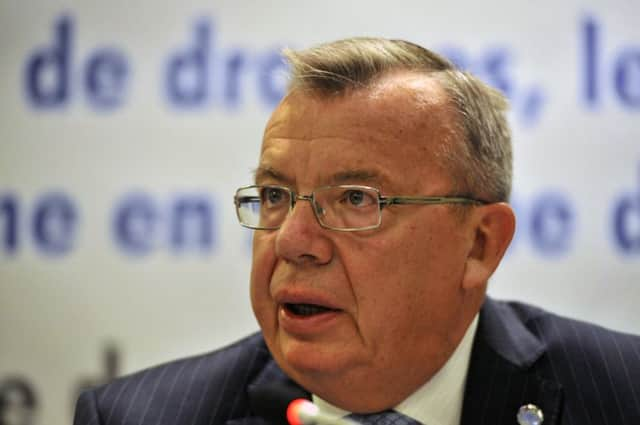Up in smoke: Iran burns seized drugs


However, it also said more people were seeking treatment for cannabis-related disorders.
The UN Office on Drugs and Crime (UNODC), issuing its 2014 World Drug Report, also said it was too soon to gauge the impact of recent legalisation moves in Uruguay and the US states of Washington and Colorado (in December 2013, December 2012 and January this year respectively).
Advertisement
Hide AdAdvertisement
Hide AdHowever, for youth and young adults “more permissive cannabis regulations correlate with decreases in the perceived risk of use”, which may affect consumption, the report said.
Research suggests falling risk perception and increased availability can lead to more young people being introduced to the drug, the UNODC said.
Global cannabis use seemed to have decreased, it said, reflecting a decline in parts of Europe.
“However, in the US, the lower perceived risk of cannabis use has led to an increase in its use,” the UNODC said. It added that the number of people in the US aged 12 or more who used cannabis at least once rose to 12.1 per cent in 2012 from 10.3 per cent in 2008.
Regarding other narcotics, a surge in opium production in Afghanistan – where the area under cultivation jumped by 36 per cent in 2013 – was “a setback”, while the global availability of cocaine fell as production declined from 2007 to 2012.
Last year, the worldwide output of heroin “rebounded to the high levels witnessed” in 2008 and 2011, the report said.
“Up to 200,000 people die every year due to illicit drugs,” UNODC executive director Yury Fedotov added.
Last year Uruguay became the first country to legalise the growing, sale and smoking of marijuana, a move aimed at curbing organised crime.
Advertisement
Hide AdAdvertisement
Hide AdCritics claim legalisation will increase consumption but open the door to the use of harder drugs than marijuana.
“Although the general public may perceive cannabis to be the least harmful illicit drug, there has been a noticeable increase in the number of persons seeking treatment for cannabis use disorders over the past decade,” the UNODC said.
But with the US-led war on drugs facing mounting criticism, success in Uruguay could fuel legalisation moves elsewhere.
In a joint statement, a group of non-governmental organisations, including New York-based Open Society Foundations, called on governments to put an end to “the expensive and counter-productive” anti-drugs war.
The UN also recently revealed that synthetic drugs such as methamphetamines and “legal highs” were undergoing an “unprecedented global expansion”.
Nearly 350 new psychoactive substances (NPS) have been identified, UNODC revealed.
New meth supply routes and production centres in West Africa and Iran were also identified.